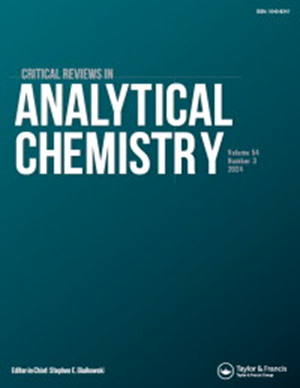CRISPR-Driven Biosensors: A New Frontier in Rapid and Accurate Disease Detection.
IF 4.2
2区 化学
Q1 CHEMISTRY, ANALYTICAL
引用次数: 0
Abstract
This comprehensive review delves into the advancements and challenges in biosensing, with a strong emphasis on the transformative potential of CRISPR technology for early and rapid detection of infectious diseases. It underscores the versatility of CRISPR/Cas systems, highlighting their ability to detect both nucleic acids and non-nucleic acid targets, and their seamless integration with isothermal amplification techniques. The review provides a thorough examination of the latest developments in CRISPR-based biosensors, detailing the unique properties of CRISPR systems, such as their high specificity and programmability, which make them particularly effective for detecting disease-associated nucleic acids. While the review focuses on nucleic acid detection due to its critical role in diagnosing infectious diseases, it also explores the broader applications of CRISPR technology in detecting non-nucleic acid targets, thereby acknowledging the technology's broader potential. Additionally, the review identifies existing challenges, such as the need for improved signal amplification and real-world applicability, and offers future perspectives aimed at overcoming these hurdles. The ultimate goal is to advance the development of highly sensitive and specific CRISPR-based biosensors that can be used widely for improving human health, particularly in point-of-care settings and resource-limited environments.CRISPR 驱动的生物传感器:快速准确检测疾病的新前沿。
这篇综合评论深入探讨了生物传感领域的进步和挑战,重点强调了 CRISPR 技术在早期快速检测传染病方面的变革潜力。它强调了 CRISPR/Cas 系统的多功能性,突出了它们检测核酸和非核酸目标的能力,以及它们与等温扩增技术的无缝整合。这篇综述深入探讨了基于 CRISPR 的生物传感器的最新发展,详细介绍了 CRISPR 系统的独特特性,如高度特异性和可编程性,这使它们在检测与疾病相关的核酸时尤为有效。由于核酸在诊断传染性疾病中的关键作用,本综述侧重于核酸检测,但同时也探讨了 CRISPR 技术在检测非核酸目标方面的更广泛应用,从而承认了该技术的更广泛潜力。此外,综述还指出了现有的挑战,如需要改进信号放大和实际应用性,并提出了旨在克服这些障碍的未来展望。最终目标是推动基于 CRISPR 的高灵敏度和特异性生物传感器的开发,使其能够广泛用于改善人类健康,特别是在护理点设置和资源有限的环境中。
本文章由计算机程序翻译,如有差异,请以英文原文为准。
求助全文
约1分钟内获得全文
求助全文
来源期刊
CiteScore
12.00
自引率
4.00%
发文量
137
审稿时长
6 months
期刊介绍:
Critical Reviews in Analytical Chemistry continues to be a dependable resource for both the expert and the student by providing in-depth, scholarly, insightful reviews of important topics within the discipline of analytical chemistry and related measurement sciences. The journal exclusively publishes review articles that illuminate the underlying science, that evaluate the field''s status by putting recent developments into proper perspective and context, and that speculate on possible future developments. A limited number of articles are of a "tutorial" format written by experts for scientists seeking introduction or clarification in a new area.
This journal serves as a forum for linking various underlying components in broad and interdisciplinary means, while maintaining balance between applied and fundamental research. Topics we are interested in receiving reviews on are the following:
· chemical analysis;
· instrumentation;
· chemometrics;
· analytical biochemistry;
· medicinal analysis;
· forensics;
· environmental sciences;
· applied physics;
· and material science.

 求助内容:
求助内容: 应助结果提醒方式:
应助结果提醒方式:


